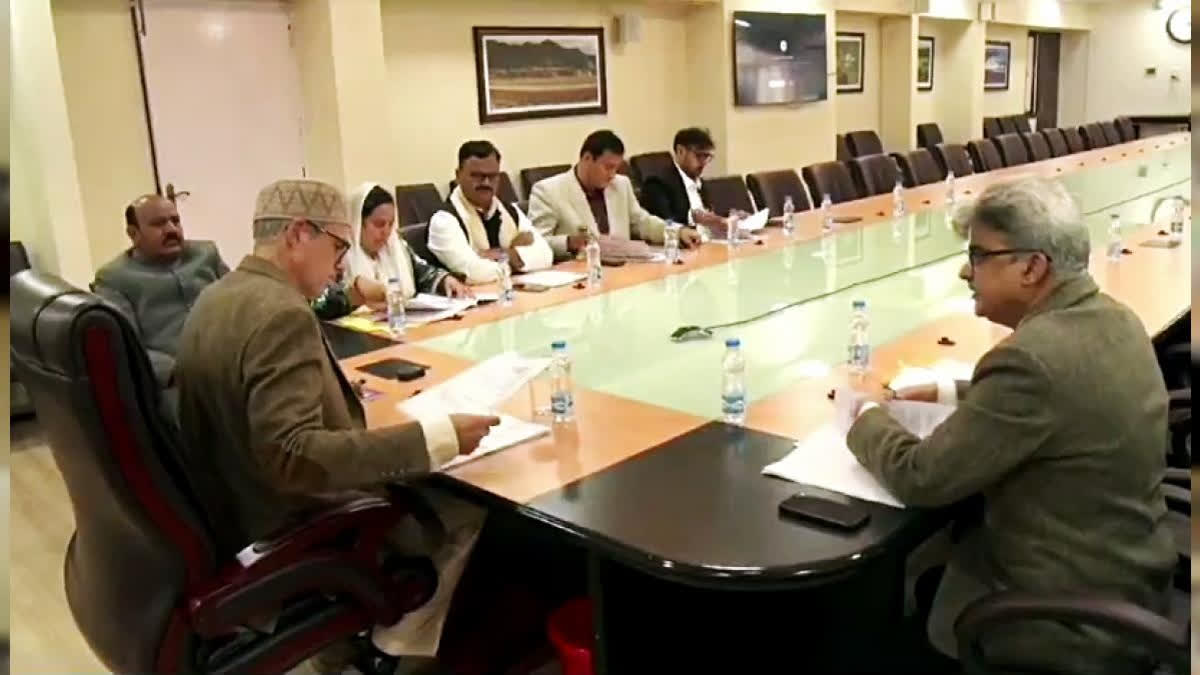Srinagar: In the inaugural cabinet meeting, the newly elected government led by Omar Abdullah passed a resolution seeking restoration of statehood to Jammu and Kashmir.
The erstwhile state was downgraded into union territory with Ladakh hived off as separate union territory in August 2019 and the Article 370 which granted special status to Jammu & Kashmir was annulled. Since then, the union territory was under direct central rule with the Lieutenant Governor representing the Centre.
Omar Abdullah became the first Chief Minister of the union territory, marking the beginning of the first elected government. The Jammu and Kashmir was under President's rule since the collapse of Peoples Democratic Party-Bharatiya Janata Party government in June 2018.
But after the National conference swept the polls securing 42 seats and its alliance partners Congress’s six and five independent legislators supporting the National Conference, the President's rule was revoked on October 11 after Abdullah staked the claim for the government formation.
Just on the second day after being sworn in, Abdullah's cabinet passed a resolution seeking statehood be restored to the union territory. Jammu and Kashmir Chief Minister Omar Abdullah is expected to submit the draft to Prime Minister Narendra Modi in New Delhi.
But legally speaking, it is not binding on the Centre to accept its recommendation and has a "symbolic" value, showing the government key's agenda.
In its manifesto, the National Conference promised restoration of statehood besides striving for restoration of Article 370 which granted special status to Jammu and Kashmir.
Legal experts suggest the union territory is governed by the J&K Reorganisation Act which allows very limited powers to the elected government.
A former senior law officer, who was part of the previous governments, argues the cabinet decisions are binding only on the subjects falling within the domain of the government.
"The decision is not binding on the central government," said the official. "It is their discretion whether to follow it or not. But it will serve as a reference point and has its own value both political as well as symbolic. It is aimed at building pressure on the Centre to follow its promise on statehood. But the final decision rests with the Centre," the former senior law officer said.
Prime Minister Narendra Modi as well as Home Minister Amit Shah have repeatedly promised, including in the Parliament, restoring statehood to Jammu & Kashmir. Upholding the constitutional validity of the abrogation of the Article 370, Supreme Court also directed for restoration of statehood to Jammu & Kashmir but without fixing any timeline.
Unlike the state legislature, the powers of the Legislative Assembly are curtailed and the key portfolio comprising law and order, jails, prosecution etc have been excluded from its domain. For these changes, the ruling National Conference had promised to pass a resolution in the first sitting of the Legislative Assembly against abrogation of Article 370, seeking the pre-August 2019 position to Jammu and Kashmir.
But legal experts and a former speaker of the state Legislative Assembly say the resolutions of the house are not binding on the Centre.
"The Legislative Assembly reflects the will of people but does not mandate the Modi government to accept it," said the ruling party legislator pleading anonymity as he was not authorised to speak on the matter.
Citing the autonomy resolution passed by the Legislative Assembly during the government led by Farooq Abdullah in June 2000, he explained that the then NDA government did not accept it.
"But it remains a historic document and reference point for the future even as it was not accepted by the then BJP government," he added.
A former government counsel said the recommendations of the Legislative Assembly on the Article 370 has no legal validity but it can reflect the public sentiments, citing several cases from other states.
One such case includes the Legislative Assembly of Puducherry Union Territory which passed a resolution for statehood as recently as August 2024, taking the total resolutions so far to 15. Urging for the full-fledged statehood, it said demand for the statehood for Puducherry had been made since 1972 but the Centre has not set up any panel.
"While Puducherry was a Union Territory, J&K was downgraded to a Union Territory. Hence, we are seeking what was snatched from us, not something new,” said a legislator.
"But we too accept that the resolution has no legal validity, but it will create pressure on New Delhi to restore our position as of pre August 2019."
The Opposition is trying to rake up the issue with many criticising the statehood resolution of the Cabinet and seeing it as scaling down from its demand of resolution against Article 370. But a senior National Conference leader said they stand by their promise of passing the resolution in the Legislative Assembly as and when the session is convened.
Amid this, NC legislator Mubarak Gul was appointed as the first pro-tem speaker of the Legislative Assembly and will oversee the swearing in on the afternoon of October 21. "There is a long time to go. The opposition should be patient," said the NC leader defending the Cabinet's statehood resolution.
Read more:
- Mubarak Gul Appointed Pro-tem Speaker of Jammu Kashmir Assembly
- Opposition Sees Cabinet Resolution On Statehood As J&K Govt's Backtracking
- J-K Cabinet Resolution Seeks Statehood Restoration; Omar To Meet Modi In Person With Draft
